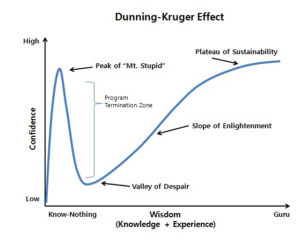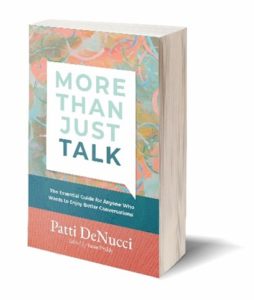Have you ever known ─ or tried to have a conversation with ─ someone who thought they were an expert on….everything? I’ll go out on a limb here and guess that the relationship ─ and the exchanges ─ with this person probably weren’t all that pleasant. I can even sense you wincing a little.
Let’s face it. Whether we are seated around the dinner table, at a social event, or at work, conversations with know-it-alls aren’t fun. Sure, this person may be highly intelligent and educated. Or they may have very strong opinions (which are different than knowledge). This person may even be one of those poor souls living perpetually on Mount Stupid.
That’s right. Mount Stupid. It’s a term I learned while reading about the phenomenon of the Dunning-Kruger Effect. Let’s call it the DKE for short. Maybe you’ve heard of it. It’s named for Cornell University psychologists David Dunning and Justin Kruger. They did a study where participants were tested on their logic, grammar, and sense of humor. Put simply, the study revealed that those who performed the worst in the test often rated their skills as far above average.
Yikes! How is this possible?
Dunning and Kruger attributed this problem to a lack of metacognition. That’s a fancy term for our ability to analyze our own thoughts, abilities, and performance. In other words, people with neither good skills nor good metacognition often make errors and reach faulty conclusions — and they don’t even realize it! Or they gain a small amount of knowledge on a topic and suddenly believe they are world class experts. (That’s where the term Mount Stupid comes in. See the graph here.) 
Other factors that may contribute to the DKE can include:
- Insecurity and/or a strong desire to impress or be seen as intelligent and confident
- Overestimation of (or the gap between) a person’s actual and perceived knowledge or skills
- Overprecision, which is an exaggerated belief that they are right
- Mistaking general intelligence for expertise in a specific area (“Hey, I’m an intelligent person, so that must make me an expert in all areas!” Or “I can drive a car, so I bet I can fly a plane.”)
- Mistaking a small amount of knowledge in an area for being a true expert (“I’m not a doctor, but I play one on TV.”)
- Getting caught up in dramatic fake news or internet searches! (“I read it on the internet, therefore it must be true! And now I’m an expert!”)
If we’re honest with ourselves, we’ve probably all gone a little DKE at one time or another. Let’s consider our teenage or college years as a prime example. (Did you know that the term sophomore, the designation for a student in their second year of high school or college, literally means “wise fool.” Think that’s by accident?) Or think about a time when you thought you would ace a test without studying, took on a big project you were certain you could handle, or were ready for a big presentation and….things didn’t go so well.
I know I’ve been there! You?
How can we avoid falling into the DKE trap, which can adversely impact our relationships, conversations, careers, and much more? We can begin by being wise enough to regularly:
- Do a reality check and assess (or even question) our skills and knowledge base, especially in areas where we feel particularly confident
- Stay curious and open to learning new things and growing our skills
- Be humble enough to realize we don’t ─ and probably never will ─ know everything
- Be brave enough to ask others for feedback and constructive criticism
- Be willing to listen to what others know and have to share
That last one ─ listening ─ is a rare and highly-valued conversation skill that will automatically improve your conversations and relationships with others. What’s more, it can keep us from getting stranded on Mount Stupid. It’s not always easy, but it’s generally worth it. Especially if we want to be the most charismatic and memorable people in the room, which is far different from wanting to be the smartest people in the room.
In closing, I will humbly add this disclaimer: While I’ve learned and shared with you a tiny bit about the DKE, I am by no means an expert on this topic. But I do find it fascinating! So, if you’re someone who truly has more knowledge or experience with this phenomenon, please share your stories, thoughts, and insights below!
Meanwhile, if you’re ready to expand and grow your conversation skills and have more conversations that are enjoyable and productive, I hope you’ll check out my new book More Than Just Talk: The Essential Guide for Anyone Who Wants to Enjoy Better Conversations. It’s loaded with strategies and hundreds of everyday tips that can help you have more of the conversations you find pleasant and energizing ─ and fewer of those you don’t. You can learn more here.



Recent Blog Comments